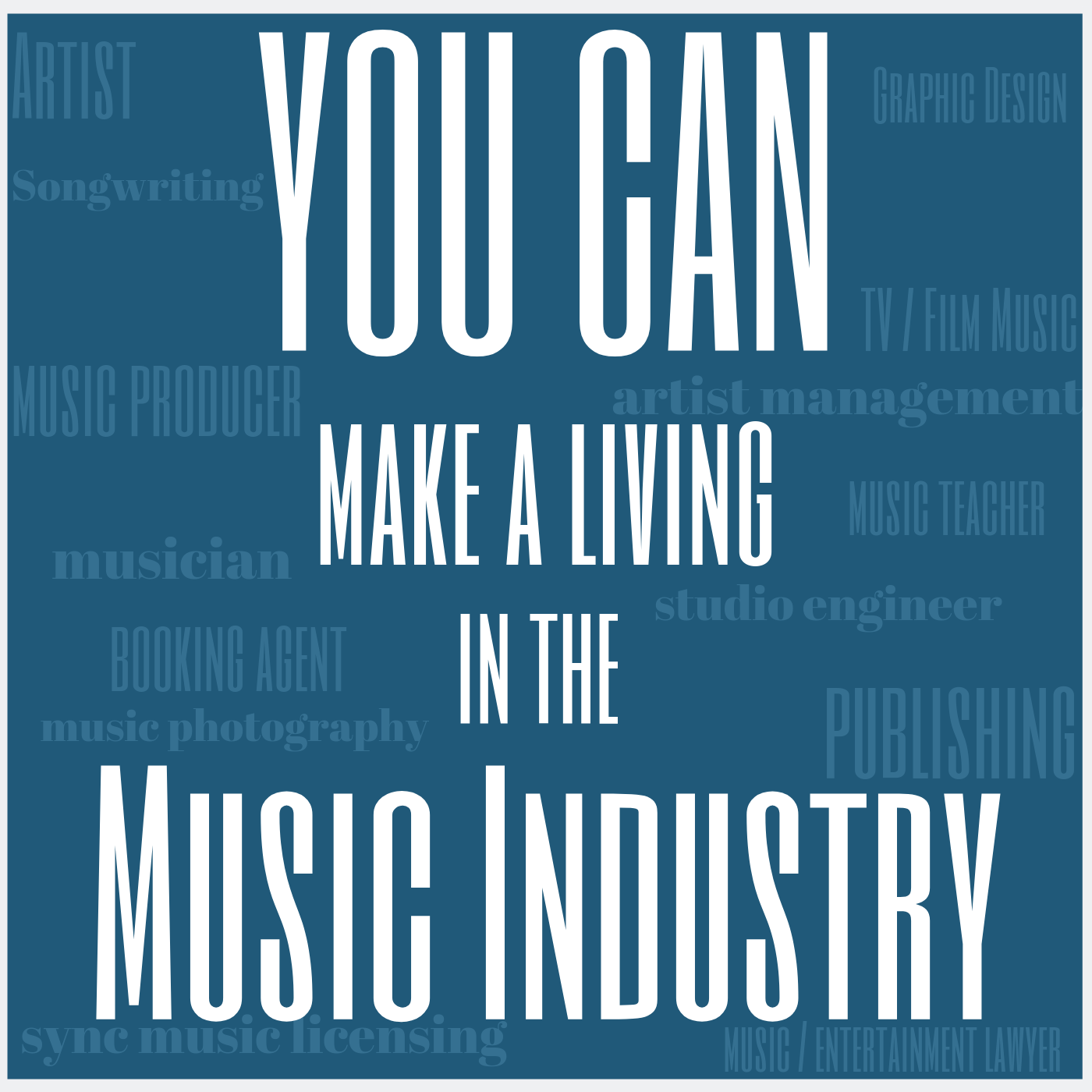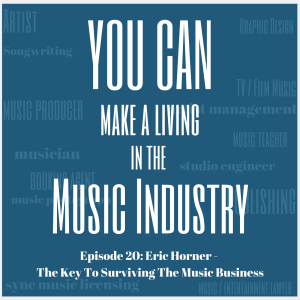

22.7K
Downloads
78
Episodes
Did you know that YOU CAN make a living in the music industry? Celebrities, working class musicians and people just like you who work behind the scenes in all areas of the music business will share their stories, encourage you and give you tools and how-to examples of the ways YOU CAN make a living doing what you love in the music industry.
Episodes

Monday Mar 16, 2020
Episode 20: Eric Horner - The Key To Surviving The Music Business
Monday Mar 16, 2020
Monday Mar 16, 2020

This week I’m talking with my old friend Eric Horner. We are both from Paducah, KY and grew up learning to play guitar at Chapman Music. Eric has worked with country music legends Lee Greenwood, Brad Paisley, Wynonna Judd and Shania Twain. He is now in full time music ministry and we discuss the behind the scenes aspects of landing gigs, what is expected of you as a session player, immersing yourself in the music scene you want to part of and the importance of you guessed it…relationships!
Show notes:
Sponsors: Edenbrooke Productions - We offer consulting services and are offering listeners a 1-hour introductory special. To request more info on consulting services, email Marty at contact@johnmartinkeith.com.
Talking Points:
*The whole key to this business is relationships.
*Go to a music city and be a part of the grape vine. Build friendships.
*Very seldom do artists have what’s called an “open cattle call” audition. Somebody knows somebody and they get the private audition because you’ve had a relationship.
*Steven Curtis Chapman and I grew up together and he taught me to play guitar. We were in a band together in college. When he moved to Nashville and worked at Opryland Theme Park, he worked with some girls who had gotten record deals and had some hits and they needed a bass player and he called me asking if I wanted to audition and I got the gig. They ended up opening for Lee Greenwood and when I heard through the grapevine that he had an opening coming up in his band, I was able to go to him because I made friends with his crew and band and they took me to him and he gave me an audition.
*Hanging out with people that are in bands is a good way to hear about opportunities.
*You need to come immerse yourself and go to any event that puts you in front of people.
*I’ve known Brad Paisley since he was 12 years old. He played guitar at smaller version of the Grand Ole Opry in Virginia. We would play there once or twice a year and we got to be buddies. He would come to the bus and we play songs together.
*He called me out of the blue and said he got a record deal on Arista Records and they were going to introduce him at Fan Fair (CMA Fest) and he asked if I would be in his band.
*I sang with Shania Twain on tv because her drummer used to be my drummer when I was pursuing a solo career. He gave them my name and they called me. There was no audition at all. I just showed up to rehearsal and did it.
*Be able to recognize people’s abilities because if you recommend someone, you’re neck is on the line.
*I pursued a solo career and had written some songs and Lee Greenwood signed me to a publishing deal and began pitching me as an artist.
*I toured with a band but never landed a big record deal.
*I started a production company called Makin’ Tracks Productions and we worked around the clock for years. Having built relationships with great players, we would use them on sessions for people who had been ripped off by other companies previously.
*Larry Rogers who owned Studio 19 and produced hit records for many country artists took me under his wing and told me to go into his studio and learn. All of those tools were at my disposal. He taught me what to do and not to do in making a record.
*Whatever you do, get up out of bed everyday and do something for your career. Regardless if it’s booking a date, writing a song, getting in the studio, etc.
*As an indie artist, you have to create your own niche.
*I became a session player because I was ready to get off the road. There is a stigma that road players can’t be a session player and vice versa. You can do it, it’s a matter of conditioning and thinking differently.
*On the road you can get away with a lot. You might be taking a 5 piece band and trying to make them sound like an 8 piece band. You can’t do that in the studio. In the studio you have to stay out of the way.
*The most important things in the studio: Time and Taste.
*You have to know when to play and when not to play. What you play has to mean something.
*It used to be you could not be on the road and be a session player. That has changed with technology. Some of the best session players around are out on the road touring now as well.
*With Makin’ Tracks Productions I got of a lot of business from NSAI because I built a good reputation and word gets around quickly.
*Now I’m a Gospel Music artist full time and work with the military.
*I got a record deal with a Gospel Music record label and since I had already recorded two new albums, I was in a unique position that they did not sink a lot of money into me. Instead they leased the albums from me but I retained ownership.
*Things did not work and the label was going under so I asked for what’s called a “peaceful release” and I purchased all of my product from them and got out without any legal problems.
*Whatever music market you’re in, get to where the music is.
*Immerse yourself, go to every writer’s night you can, meet band members and make friends with them.
*Become part of the fabric of whatever music town you’re in.
*The key to surviving the music business is relationships.
*The internet has leveled the playing field so a lot of people can have a career that couldn’t before.
*Don’t ever think you’ve got to get a major record label deal or you can’t do music. You most certainly can.
*Facebook - Eric Horner Ministries, Operation Tank Full of Love , His Tunes Studios
Music has always been a major part of Eric Horner's life. With Steven Curtis Chapman as his first guitar teacher, Eric grew up with a guitar in his hands playing and singing Gospel music all over Western KY near their hometown of Paducah.
Eric moved to Nashville TN at the age of 19 to pursue his dream of becoming a professional songwriter and musician. It didn't take long for the doors to open and over the next 17 years Eric toured the world playing and singing backup with such artists as Lee Greenwood, Shania Twain, Wynonna Judd and Brad Paisley.
In 2002, all of that changed. Eric began to feel a call on his life to return to his Gospel music roots and to use his talents for a higher purpose. He surrendered to full time music ministry in the Fall of that year and hasn't looked back since. Eric and his wife Debby spend over 200 days a year on the road ministering in churches and military bases all across America.
God has given them the unique opportunity to encourage and minister to the newest members of our military as they go through basic training. Eric places a big emphasis on Faith, Family and Freedom along with a call to evangelism in his worship presentations. “With the division we are now seeing in America, there’s never been a more important time for the church to go out and shine His light and be the hands and feet of Jesus in our communities”.
No comments yet. Be the first to say something!